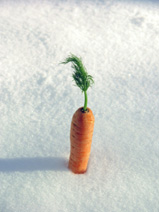|
Winter Gardening:
There are a lot of things to do when winter arrives, but sadly working in the garden isn’t one of them…... However, there are still many things that can be done to keep busy, like the ones mentioned above. In Late winter seeds can also be started indoors in preparation for outdoor planting. But if you have a greenhouse……. The growing season doesn’t end. But Wait - Winter Crops Can be Achieved:Much like gardening during the other seasons it is a good idea to know as much about the plants that you are growing as possible, as well as the plant zone that you live in. This is crucial as vegetables and other plants have certain environmental needs, and the biggest thing, with winter gardening, is to know the drop in temperatures that these plants can withstand. There are certain plants that do better in colder climates and temperatures than others. But for all of them it is very important that their roots do not meet the freezing point. That being said, it is important to know the dates that your area will likely reach these temperature lows to properly plan the date that the seed should be planted to make sure that it will reach maturity, and can be harvested, before the area that it is being grown hits the freezing/frost point. There is a list of cool weather crops and their approximate maturing times at the end of this article.Greenhouses and other ways to prolong the growing season:Winter Greenhouse:Greenhouse gardening helps to provide a frost free environment for any plant, as well as helps to protect from the drying winds of winter. For a winter greenhouse any choice is a good one, but the lean-to greenhouse’s supporting wall acts as a wind breaker and uses the walls thermal mass as a way to store heat that will radiate at night increasing the night time temperatures, when they are at their lowest. It is important to use as much of the winter greenhouse solar heating capabilities as possible, take a look at the solar greenhouse gardening video, on the solar greenhouse page for a great explanation and ideas for this topic. Raised Bed Gardening:With winter gardening it is common practice that the grower use raised garden beds as they heat quicker and retain the heat longer than if they were just planted directly in the ground. These raised beds can also be warmed using warming bed wires and mulch insulation. Raised beds can also be covered with a hoop house cold frame as illustrated by a great video on raised bed gardening on our Greenhouse Gardening Videos page. Row Covers:Row Covers are a great way to lengthen the growing season and increase the temperature of the area surrounding the plants being grown. Row covers are a very economical way to grow your winter vegetables, and can be easily constructed using 1” PVC pipe covered with a greenhouse poly film. Row covers trap solar energy as a regular greenhouse would, just on a smaller scale, and can be looked at as both portable and temporary. Cold Frames:Cold frames are easy to construct and are a good way to heat up the surrounding area for the plants to stay frost free. These are also a good option if there are plans to heat the bed as they will help to contain the heat. Winter Vegetable Garden - Which plants are best for garden winter?:Leafy vegetables and root crops are the best and most hardy choices for winter gardening. As mentioned above it is important to plan ahead and plant so that the winter vegetable garden will mature before the first frost occurs. If you use a greenhouse this helps to prolong the season even further. Gardening Book Review:Growing vegetables throughout the year can also be achieved without supplemental heat…. .. I highly recommend the book: Four-Season Harvest: Organic Vegetables from Your Home Garden All Year Long – by Eliot Coleman for a full review take a look at our greenhouse books page, for a full review. In a nutshell he explains that winter gardening is possible, with careful planning and proper selection of the right vegetables to grow at the right temperatures it is actually quite easy to grow vegetables throughout the year without artificial heating. Roots and Vegetables that are perfect for Winter Gardening:Vegetables that take longer to mature (approx. 90 days to mature) – plan for harvest in the fall September/October, or before first frost – plant accordingly:
Root and Vegetable Crops (approx. 60 days) – plan for harvest in the fall October, or before first frost – plant accordingly:
Root and Vegetable Crops (approx. 30 days to mature) – plan for harvest in the fall October, or before first frost – plant accordingly:
Again these plants are great choices for winter gardening, especially if you plan to grow in a greenhouse throughout the winter, and want to stay away from heating the greenhouse. The frost can be kept away from greenhouse plants so growing can pretty much occur throughout the winter.
|





